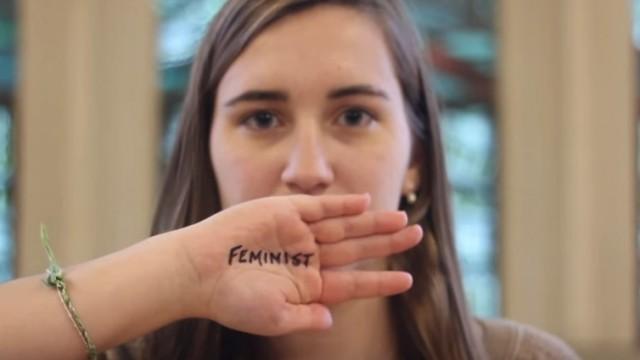
This past week, students wrote “feminist” on their hands and put them over their mouths. Images of these students, who were participating in the F-Word campaign, spread across Facebook.
To represent the various ways of empowering women, the Women’s Center, the Undergraduate Government of Boston College, Women in Business, Lean In, and I Am That Girl have collaborated in developing the AdvanceHER campaign. To kick-off this year-long initiative, the members have developed the F-Word campaign, spearheaded by Grace Lipo, director of UGBC’s Women and Gender Programming for Student Initiatives and MCAS ’18. The kick-off campaign began last week and runs until Thanksgiving break.
The F-Word is a campaign where individuals in the BC community are asked to post a picture on Facebook with a caption explaining what feminism means to them. The effort is meant to bring a better understanding of what it means to be a feminist and why it is important.
AdvanceHER started as an idea Alyse Belavic, MCAS ’16, began to develop over the summer with the Women and Gender Committee in UGBC, she said. Belavic, director of UGBC’s Women and Gender Programming for Student Assembly, believed women’s groups on campus needed to collaborate.
Belavic explained that last year there were instances when two separate women’s clubs would have similar events within weeks of one another. She said that, as a result, the marketing power of these clubs was then poorly dispersed. As a branding campaign, AdvanceHER grew out of Advance, an association of members of women’s groups that meet once a month to discuss what each group is working on. Belavic said that AdvanceHER is similar, but on a more collaborative level.
“[All of the women’s groups] have different focuses within women’s issues,” Temi Ojo, assistant director of Women and Gender Programming for Student Initiatives and MCAS ’18, said. “But we’re all trying to accomplish female empowerment.”
Both Ojo and Lipo noted that UGBC’s Women and Gender Committee focuses on self-esteem, while Women in Business is career-oriented.
AdvanceHER, however, unifies the groups over the issue of empowerment and the F-Word campaign is just the start.
“Some people say, ‘Oh, yeah, I’m totally a feminist,’ and other people say, ‘No, I’m not a feminist, I don’t hate guys.’ There’s a lot of misrepresentation of what the word actually means and who it actually applies to.”
-Alyse Belavic, MCAS ’16
After spearheading the UGBC’s What I Be campaign last year, Belavic said she saw that BC was still lacking female empowerment. Lipo and Ojo also expressed their concerns about the need for female empowerment.
“What really spoke to me is that there is a big issue of women bringing other women down,” Lipo said. “I think to have a unified effort of women helping other women on campus really shows to the women on campus the idea of empowerment.”
The word ‘feminism’ often sparks a lot of different reactions, Belavic said.
“Some people say, ‘Oh, yeah, I’m totally a feminist,’ and other people say, ‘No, I’m not a feminist, I don’t hate guys,’” Belavic said. “There’s a lot of misrepresentation of what the word actually means and who it actually applies to.”
She said the F-Word campaign gives people a chance to express what feminism is to them and redefine the word, as well as emphasize self-empowerment.
“By definition, if you’re empowered by who you are, you’re a feminist,” Belavic said.
The photo campaign is an ongoing initiative. In the past there have been events where people completed the sentence, “I’m a feminist because….” She explained that the F-Word is a way to twist the idea and challenge people to define feminism as they see it.

By coupling this with a photo, the campaign hopes to attract people to join the movement.
A Facebook page for AdvanceHER was released on Nov. 19, where individuals can tag themselves. Organizers hope students will post their own photos, in addition to the ones already uploaded on the page.
“I think too often people think you can only be empowered if you go into a career and are the top female, or you do the ‘guy’s’ job,” Belavic said. “For me, I shouldn’t base how I feel about myself on what other people think of me. I should be empowered in myself, as a person and the decisions I make to be happy.”
Belavic explained that this idea of empowerment is universal, and AdvanceHER wants to bring people together. The F-Word campaign does this by sparking conversation in a different way.
Lipo said that there’s a common misunderstanding among men that they can’t be feminists. Feminism is the belief that men and women should have equal rights, she said, and that is something people of all genders can stand for. Lipo and Ojo both expressed their hopes for male involvement, as well.
They hope to incorporate men’s viewpoints in the F-Word campaign, and have already taken photos of some men for the project.
“Overall, I hope that more people are willing to accept the definition of feminism and get rid of some of the stigma surrounding that word,” Belavic said. “Secondly … let’s stop talking about the perfect BC student and start talking about the BC student that’s empowered in every aspect of their life because that’s healthy and that’s really challenging.”
Featured Image courtesy the AdvanceHER Facebook page